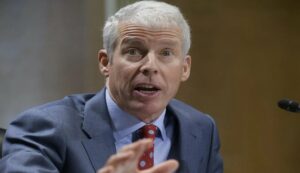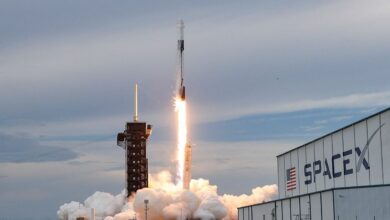US Energy Secretary highlights strategic partnership between US and UAE in AI and advanced technology
Abu Dhabi: During his visit to the United Arab Emirates, US Secretary of Energy Chris Wright underlined the robust and expanding strategic collaboration between the US and the UAE in the areas of advanced technology, energy, and artificial intelligence (AI).

Wright, who is in the United Arab Emirates on his first official overseas visit, said that the two countries’ bilateral ties are seeing “rapid growth” in both joint collaboration and investment. His three-nation regional tour is intended to deepen relations with important energy and geostrategic partners.
Wright said he was impressed by the UAE’s early embrace of AI in its energy industry when visiting ADNOC headquarters. “The UAE has, in my opinion, been a pioneer in AI.” Today, I witnessed amazing advancements in integrating AI into their own energy system, along with a clear vision for their future,” Wright told reporters. He foresaw prolonged geopolitical collaboration between the two countries as well as substantial energy and artificial intelligence cooperation, requiring large investments in both areas.
Wright clarified that there are significant prospects for both American and Emirati investments in the United States in answer to a query about mutual investments, particularly in light of the establishment of the UAE’s XRG enterprise. These include technological and financial flows.
He went on to say that the next stage of energy consumption, especially for electricity and natural gas, would be driven by artificial intelligence.
Wright said that his nation welcomes international investment and is attempting to lower prices and empower the private sector, making it a desirable location for investments in the advanced energy, oil, and gas industries.
He said that the forces of the free market, not any one party, decide the price of gas and oil. He pointed out that although natural gas output is expanding quickly due to greater export capacity and increasing domestic demand, oil production in the US is still at excellent levels.
He stated, “In the long term, I believe we will see a gradual decline in oil and gas prices in the United States, and we hope this will also happen globally.” He said that market expectations of supply and demand are mostly responsible for short-term price changes.
Wright affirmed that energy businesses would continue to lower production costs and face fewer regulatory restrictions, which will benefit the industry, and underlined that this price fall does not inevitably translate into a loss in corporate profitability.
He underlined that reducing energy prices is a key component of President Donald Trump’s plan in order to raise business competitiveness, raise investments, and enhance living conditions for citizens. He pointed out that the present US government wants to boost the rise of energy consumption by reshoring businesses, increasing living standards, and developing artificial intelligence.
Additionally, he highlighted new energy-related investment efforts, such as XRG, which aims to enhance the quality of life for people and communities throughout the globe by investing in low-carbon energy, chemicals, and technology innovation.
He emphasised that AI necessitates large financial outlays and sophisticated knowledge, which creates an ideal environment for strategic alliances between the US and the UAE.
Wright praised the degree of technology used in oil and gas production as well as the UAE’s early investments in artificial intelligence technologies, explaining that cash and technology flows are flowing both ways.
In parallel with the anticipated rise in production, he stated that the United States is getting ready for a new phase of robust growth in demand for gas and oil in the upcoming years. He noted that artificial intelligence will play a significant role in this expansion, especially by increasing demand for electricity and natural gas.
He pointed out that President Donald Trump is spearheading a trade plan based on the ideas of attaining global trade balance and reviving the US manufacturing sector, both of which help to boost wages and create jobs locally.
He clarified that while the United States has always been open to imports, its trade partners have not been as receptive to its exports. He continued by saying that the US government is using instruments like tariffs to boost domestic sectors and work towards reciprocity.
Despite the difficulties that may arise during the transition period, he pointed out that these measures would help to bolster economic development in the US and throughout the world.
In reference to the relationship between Iran and China, he said that first talks are in progress with China and expressed hope for a mutually beneficial agreement.
He emphasised the significance of serious negotiations and acknowledged the United States’ commitment to preventing Iran from obtaining a nuclear weapon because of the threat it poses to the security of the Middle East and the world. He said that the primary goal with regard to Iran is to terminate its nuclear programme.





